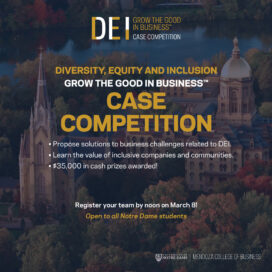A priest intrigued by wealth creation
Published: November 6, 2007 / Author: Stephen Coan
Ethics are something businesses acquire when they can afford to. “That’s often true,” laughs Oliver F. Williams. “But that is not what I teach! I teach that ethics is good business. There are many case studies showing that following good business ethics means good business. Good ethics enhance not only your personal life but your business life.”
Williams, director of the Centre for Ethics and Religious Values at the University of Notre Dame in the United States, is currently in South Africa serving as a visiting professor in a joint appointment from the Graduate Schools of Business of the University of Cape Town and Stellenbosch University. He was hosted in Pietermaritzburg last week by the University of KwaZulu-Natal’s Unilever Ethics Centre.
Williams has visited this country many times and during the eighties investigated the issue of international investment during apartheid. His stance? “Will being here help black people dismantle apartheid? If not, then get out.”
Williams’s work played a role in the creation of the Global Sullivan Principles which promote human rights in business and he subsequently served on the national advisory board to the Sullivan Principles.
Williams’s interest in business ethics began on Wall Street. “I grew up in New Jersey, 30 miles [48 kilometres] from Manhattan, and during school holidays I worked on Wall Street as a runner, taking messages. I became intrigued by business, by the process of wealth creation — how it worked, its strengths and its weaknesses.”
* * *
Given such an interest it’s perhaps surprising to discover that Williams is a Catholic priest, a member of the Congregation of the Holy Cross religious order which is mainly devoted to education. While studying at the Notre Dame seminary his interest in business and ethics steered him into an academic career which has seen Williams write numerous articles on the
subject as well as either editing or authoring 14 books. In Global Codes of Conduct he examined the phenomenon of globalisation which, although it holds out the promise of prosperity for rich and poor countries alike, also poses a threat: “the threat is the growing perception, by nations and individuals, that we can no longer control our way of life”.
When it comes to regaining that control Williams cites the case of the American sports shoe manufacturer, Nike. “The company sub-contracted the manufacture of its products to companies in developing countries and didn’t care how it was done. But people objected, saying ‘Yes, you make great gym shoes but they are made in sweat shops.’ Nike responded saying this was the
fault of the sub-contractors over whom it had no control. It was then pointed out to Nike that ‘if you can control the quality of the gym shoes you can control the quality of your sub-contractors and their labour practices’.”
The company changed its stance dramatically. “Now Nike is a great social responsibility company.” But, as Williams points out: “For every company like Nike, there are hundreds of others operating under the radar” — thus demonstrating the need for a global business code of conduct.
That global code came about as a result of a speech made by UN Secretary- General Kofi Annan to the World Economic Forum at Davos in 1999. “He said that if you want world trade to continue without a backlash you need a global compact that all subscribe to.
“He was being prophetic, he wasn’t planning anything,” says Williams, “but business responded and said ‘why not have a global compact?’.” This led to the creation of the United Nations Global Compact, the world’s largest voluntary corporate citizenship initiative with over 3 000 members. Williams is one of its three-person Board of Directors.
“There is not going to be a world government in our lifetime but we need something like this to make corporations accountable. It’s things like that, that are the answer to the feeling you have no control.”
* * *
While in Pietermaritzburg, Williams gave a presentation titled “Escaping the Poverty Trap in Africa”. He endorses the views expressed by Jeffrey D. Sachs in his book The End of Poverty. “People don’t need big developments and infrastructure but they need to be empowered to take charge of their lives. They need basic things like healthcare, seed, water, school feeding schemes, education. That empowerment helps them get on to the first rung of the ladder out of poverty.”
This vision motivates the UN Global Compact Millennium villages — “The idea is to pick small rural villages and see what works and doesn’t work” — and it also motivated American multi-national General Electric (GE). “They went and listened to groups in villages and they found healthcare was a primary need.” GE met that need with clinics and hospitals and then provided the management and skills training to make the project self-sustaining.
But, says Williams, the really interesting question is why is GE doing this in the first place? “They say ‘We are doing it because our people want us to do it — they want us to take on the problems of the wider society’.”
This makes sense when you look at the origins of capitalism in the 19th century, says Williams. “Then power was in the hands of governments, churches and the upper classes. That is no longer the case. Today the power is to be found in business. And with that power comes responsibility.”
###
/news_and_events/news_articles/article/1176/a-priest-intrigued-by-wealth-creation




